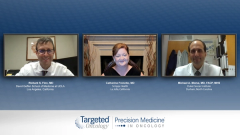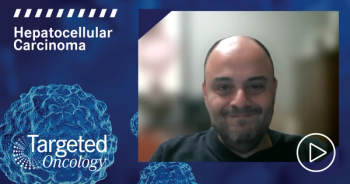
Atezolizumab/Bevacizumab Data in Frontline HCC
Episodes in this series

Richard S. Finn, MD: In liver cancer, we recently saw the approval of atezolizumab, a PD-L1 antibody, in combination with bevacizumab, an anti-VEGF antibody, based on the IMbrave150 study that was published in the New England Journal of Medicine in May of 2020. The drug was approved by the FDA a few weeks later.
For the first time, we have a regimen that improved overall survival [OS] versus sorafenib, right? We had commented that lenvatinib and sorafenib were noninferior. However, we actually saw very significant improvement in overall survival, with a hazard ratio for OS of 0.58; improvement in PFS [progression-free survival], with a hazard ratio of 0.59; and response rates of about 27%—objective response rates.
I have lived through this era of metastatic drugs, with multikinase inhibitors and even the single-agent PD-1 inhibitors—nivolumab and pembrolizumab, which have approval in the second-line setting based on accelerated approval mechanisms—where we see response rates of around 15%, or 18%, 20% at best in the second-line setting. But now, we have a regimen that’s giving objective responses over 27% and actually shows improvements in quality of life. But like always, the regimen has some safety concerns.
Catherine, you’re a liver doctor, and we’re talking about antibodies. One of them can cause autoimmune phenomena, and one can cause bleeding. How do you look at the atezolizumab/bevacizumab data as a hepatologist, and regarding safety concerns?
Catherine Frenette, MD: I was actually very impressed with the safety that I saw in the studies. They were very careful about choosing patients. Every patient had to have an endoscopy within 6 months, and any varices that were high risk had to be treated per local standards. That was very important, I think, to maintain safety and show that bevacizumab, a VEGF inhibitor, can be used safely in patients with underlying chronic liver disease. We know it is associated with increased bleeding risk, and we are aware of the wound healing issues, of course.
If you think about it, all of the TKIs [tyrosine kinase inhibitors] have VEGF as part of their actions. Every patient with cirrhosis and liver cancer needs to have an endoscopy for variceal screening anyway. In addition, all of the TKI studies actually needed an endoscopy as well. So this was not an unusual part of this study, but I think it’s a big discussion just because of the historical experience with bevacizumab that we’ve seen.
I do worry about patients with underlying liver disease developing immune-mediated adverse events, whether it’s autoimmune hepatitis, or even autoimmune nephritis or pneumonitis. A lot of times, these patients are a bit fragile. Developing an immune-mediated adverse event can sort of make them fall off the cliff, so to speak. So I do have anxiety about it. I do think they need clear education and need to be provided with warnings about starting these drugs. “Hey, you may develop this. It may result in decompensation of your liver. It could even potentially result in death. You may need steroids.”
However, the percentages that we saw were very low. In the atezolizumab/bevacizumab study, fewer than 10% of patients actually developed autoimmune hepatitis. And a very low percentage actually had to stop therapy because of immune-mediated adverse events. I think it was around 10%.
That was very promising. Obviously, when we talk more in this discussion about the combination of the PD-1, PD-L1, and the CTLA-4s, those combinations have quite a bit more toxicity in terms of immune-mediated events. We have to have a further discussion about those, with regard to safety. But in general, I’m very comfortable with the safety of atezolizumab/bevacizumab, at least in patients with Child-Pugh class A cirrhosis.
Richard S. Finn, MD: Yes. When you lined it up to its active control, which was sorafenib, it actually had a very favorable safety profile.
Transcript edited for clarity.





















